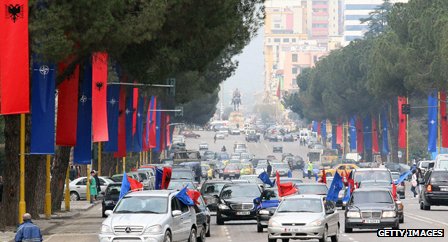Albania profile

Albania is a small, mountainous country in the Balkan peninsula, with a long Adriatic and Ionian coastline.
Along with neighbouring and mainly Albanian-inhabited Kosovo, it has a Muslim majority - a legacy of its centuries of Ottoman rule. Overview
After World War II, Albania became a Stalinist state under Enver Hoxha, and remained staunchly isolationist until its transition to democracy after 1990.
The 1992 elections ended 47 years of communist rule, but the latter half of the decade saw a quick turnover of presidents and prime ministers.
 Albanians celebrated joining NATO in 2009
Albanians celebrated joining NATO in 2009
Many Albanians left the country in search of work; the money they send home remains an important source of revenue.
During the Nato bombing of Yugoslavia in 1999, nearly 500,000 ethnic Albanian refugees from Kosovo spilled over the border, imposing a huge burden on Albania's already fragile economy.
While there have been signs of economic progress with inflation under tighter control and some growth, the country remains one of the poorest in Europe outside the former Soviet Union.
At a glance
- Politics: Prime Minister Sali Berisha's Democratic Party was the first opposition force in Albania following the fall of the communist regime in the early 1990s
- Economy: Albania is transforming into to a market economy, but is poor by Western European standards. Agriculture is a key sector and a major employer
- International: Albania joined Nato in 2009. The EU has yet to approve Albania's application for candidate status
Country profiles compiled by BBC Monitoring
Unemployment remains stubbornly high, and the infrastructure and corruption continue to deter much foreign investment. Agriculture, an important sector, still suffers from underfunding.
Albania made a formal application for membership of the European Union in 2009, on the basis of a 2006 Stabilisation and Association agreement.
The EU is keen to encourage further reform, particularly as regards stamping out organised crime and corruption and developing media freedom and property and minority rights.
There were violent protests in Tirana in early 2011 against alleged kickbacks in a power station deal and vote-rigging in the 2009 parliamentary election. Four demonstrators were killed in clashes with police.
 Worshippers gather outside Tirana's main mosque. Albania has a Muslim majority - a legacy of its centuries of Ottoman rule
Worshippers gather outside Tirana's main mosque. Albania has a Muslim majority - a legacy of its centuries of Ottoman rule


 Greek PM to reveal new cabinet
Greek PM to reveal new cabinet Syria jet pilot defects to Jordan
Syria jet pilot defects to Jordan Art of rejection
Art of rejection The cult of TED
The cult of TED Changed by Bali
Changed by Bali Through a lens
Through a lens Alan Turing: Man and myth
Alan Turing: Man and myth Talking Movies
Talking Movies